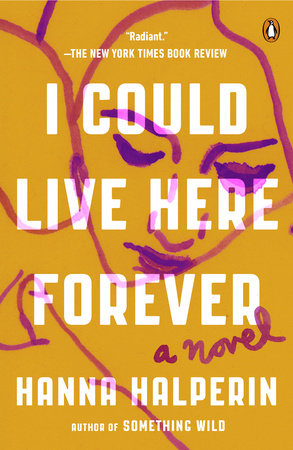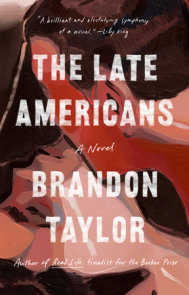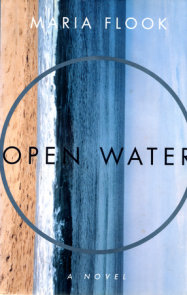READERS GUIDE
Introduction
AN INTRODUCTION TO I COULD LIVE HERE FOREVER“Leah—Charlie’s voice emerged from my phone, soft but urgent—when I was driving over here I almost did something really bad. Something I could never take back. But then I thought about you. I realized you’re the only person in my life who really matters. I’m outside your door and I know you’re there and I just want to talk to you about what’s been going on in my life because I think you’re probably really confused or someone’s been telling you something untrue about me. I love you.” (pp. 134–35)
When Leah Kempler meets Charlie Nelson at a grocery store in Madison, Wisconsin, she feels instantly drawn to him in a chemical, primal way. And it’s mutual—he meets her passion with histrionic text messages and crooning love songs. They spend entire days together in bed. In their happiest moments, they see the best in each other and in themselves, and this is irresistible to them. It starts to feel like nothing else matters, and their relationship begins to overtake them both. Leah writes less—even though that’s why she moved to Wisconsin—and time seems to slip away in each other’s company. Charlie is a recovering heroin addict, and his behavior is erratic and concerning. He’s inconsistent, oscillating between brief bursts of manic energy and falling asleep in his car or in the bath. They don’t go on dates. They distance themselves from the other people in their lives and take up a new shared reality in which everything orbits around their relationship.
Leah knows, on some level, that there’s a dark underside to her relationship with Charlie. But their connection feels so real, so powerfully natural. She burrows deeper, dismissing the concern of friends and family, the psychologically simplistic reasoning they lean on to explain why she’s so entrenched in an obsessive relationship with an addict. It’s not because Leah’s mother abandoned her family when Leah was just thirteen. Nor is it because Leah is a writer, always disappearing into fantasies and melodramas. The overpowering truth, Leah is convinced, is pure—she and Charlie love each other. His vulnerability is magnetic to her. The sex is incredible. Being close to him is the greatest feeling in the world, even as they perfectly enable each other’s most dangerous tendencies. She doesn’t think he has relapsed—he promises her he’s never going to use again—but her denial runs so deep that she can’t see beyond the haze of her own love, pain, and codependence.
Breathless and unflinching, I Could Live Here Forever is a hypnotic, propulsive dive into the interiority of two people who throb with passion and find in each other a depth of connection that feels fated. With piercing candor and tenderness, Halperin examines the messy, complex experience of losing yourself in a relationship and coming back up only to wonder if life is richer in the extremes.
A CONVERSATION WITH HANNA HALPERIN
Charlie and Leah’s relationship is at the center of the novel. What most interested you about this relationship? Did the way you see Leah and Charlie—as individuals and as a couple—change over the course of writing the novel?
I was interested in the intensity of Leah and Charlie’s relationship. I wanted to write about a kind of love that felt shameful to Leah but at the same time was inevitable and magnetic and real. The way I saw Leah and Charlie and their relationship was constantly changing as I was working on the novel. This grayness was disturbing to me, but that is also what I found compelling about writing it. I was writing about the relationship to inhabit it and attempt to portray their specific intimacy, not to diagnose it or to make an argument about it being a certain type of relationship.
Can you talk about what it was like to write about addiction? Have you always been attuned to addiction and the various shapes it takes in people, or did the way you see addiction evolve as you were writing the novel?
I knew that as much as this novel would be about drug addiction, it would also be about the feeling of being addicted to another person, and how impossible it can feel to leave a relationship even when you know it’s bad for you. Writing this book made me think so much more about all the different ways we lose ourselves—whether it’s through a relationship or validation or success or through stories or art or making art. It was through writing about addiction that I started to see how these different kinds of obsessions and addictions mirrored and played off of one another.
What kind of research did you do for this novel? What other books informed and inspired your writing?
I did a lot of research about addiction, particularly heroin addiction—although I researched years before I ever sat down to write. I’ve been gathering research in sort of a natural way over the past seven years—through fiction, movies, documentaries, and reading about it online. During my one semester in social work school in 2019, I chose research topics having to do with opioid addiction. I imagine many people can relate to this—after I grew close to someone and then lost that person to addiction, I started noticing it a lot more. The headlines in the news or the books that had to do with it, even other addicts in my life who I hadn’t realized were addicts—all of that had new meaning to me. I’m by no means an expert on addiction, but I know much more about it now than I ever did while I was growing up. I’m attuned to it differently in the domestic violence counseling work I do, too.
A few books that inspired the writing of this novel or were useful reads for me during revision: Normal People by Sally Rooney, Lucky Us by Joan Silber, Long Bright River by Liz Moore, and Acts of Desperation by Megan Nolan.
There’s a through line in the novel about motherless daughters and childless mothers. What role do you think Faye plays in Leah’s relationship with Charlie, and do you think Leah reaches a new understanding about her own mother?
Leah feels more at home in the Nelsons’ house than in her home. Being in Charlie’s house in the suburbs with Faye is comforting to Leah, but I see Leah’s attachment to Faye as another way for Leah to sink into denial and into the parts of the relationship with Charlie that feel good in the moment. Faye’s maternal warmth complicates things for Leah. Leah desperately wants to believe that Faye loves her. She doesn’t allow herself to recognize that Faye might be more protective over Charlie than she is over Leah.
I don’t know if Leah reaches a new understanding about her mother, except that she lets go of needing one so badly.
Whether it’s through binging TV shows, sex, writing, drugs, or alcohol, the characters in the novel are all looking for ways to make life more bearable. Do you think we are predisposed to these tendencies, and is there something inherently unhealthy about behaviors that self soothe and/or resist reality?
It’s so natural to find ways to self soothe, and I don’t see this as inherently healthy or unhealthy. This novel is a lot about depression and loneliness. It’s human, I think, to turn to these things—TV, reading, sex, drugs—as a way to numb pain. Sometimes it’s these coping mechanisms that save us—and sometimes they can be completely devastating.
Writing is one thing that makes me feel alive and connected in a way that nothing else really does. I wrote the first draft of this novel during the pandemic when I’d been feeling pretty low. Writing connects me to the world but also separates me from it. I live inside the draft—an imaginary world—but the intense experience of writing gives me a sort of energy to engage in the real world in a way I sometimes feel I am missing. Sometimes it feels drug-like.
QUESTIONS AND TOPICS FOR DISCUSSION
1. Leah is so deep in her relationship with Charlie that she is in denial when he begins to relapse. What was your experience reading this part of the novel? Was it clear to you that Charlie was in trouble, or were you, as a reader, so entrenched in Leah’s perspective that you believed him, too?
2. Did you think Leah was a reliable narrator? Did you ever question the objectivity of her perspective? When and why?
3. The novel orbits around Leah and Charlie’s consuming, destructive relationship. How do you define toxic relationships? Why do you think someone might stay in a toxic relationship?
4. Charlie explains to Leah what heroin feels like: “Imagine you’re in pain—the most excruciating pain of your life. Your skin is on fire and your thoughts are agonizing you and any inch of light or movement makes you nauseous. And you’re scared because you don’t know when or if it’s ever going to end. . . . But you know that there’s a button somewhere, and all you have to do is press that button, and that pain will vanish. It will just disappear. . . . And you will feel warm and safe and completely protected. That button is heroin.”
Addiction is examined in several ways in the novel. Beyond drug addiction, what other kinds of compulsions do the characters have? What role do these other forms of compulsion play, and how do they affect the way power and control are exerted in the novel?
5. Did reading about Charlie’s addiction and its impact on the people around him—especially on Leah and his family—make you think about the opioid epidemic differently? How did the depiction of heroin addiction in the novel compare to your understanding of the problem from the news or from your personal life?
6. What were your feelings about Charlie? Did they change over the course of the novel?
7. Charlie believes that he was destined to become addicted to heroin. Do you think there are aspects of Charlie and Leah’s relationship that mimic addiction? Do you believe that some relationships are fated or connected in a way that is predetermined?
8. Discuss Leah’s relationship to writing. How do you think it’s influenced by Charlie, by her mother, by her lonely childhood? Do you think Leah’s propensity for fiction and storytelling affects the way she understands and experiences her relationship with Charlie?
9. Leah’s mother abandoned the family when Leah and her brothers were teenagers. Thirteen years later, Leah travels to St. Paul to pay her a visit. What did you think of this encounter? Did you think Leah understood something new about her mother, or herself, after this visit?
10. Do you think Leah’s relationship to men, and to romantic partnership, changes by the end of the novel?






















